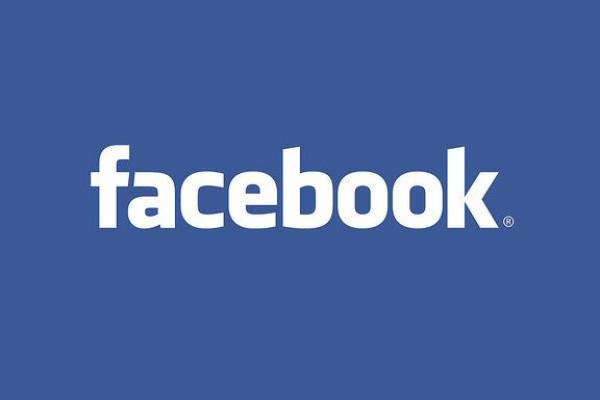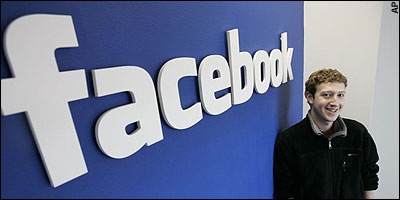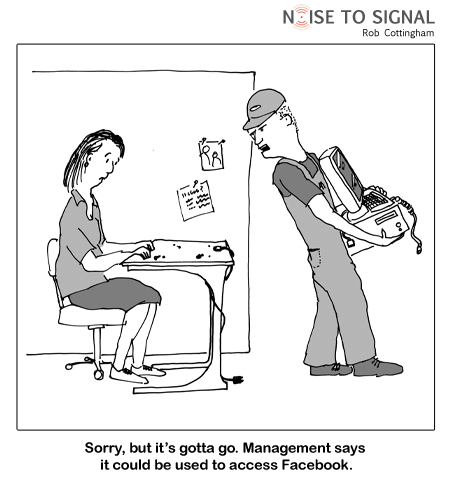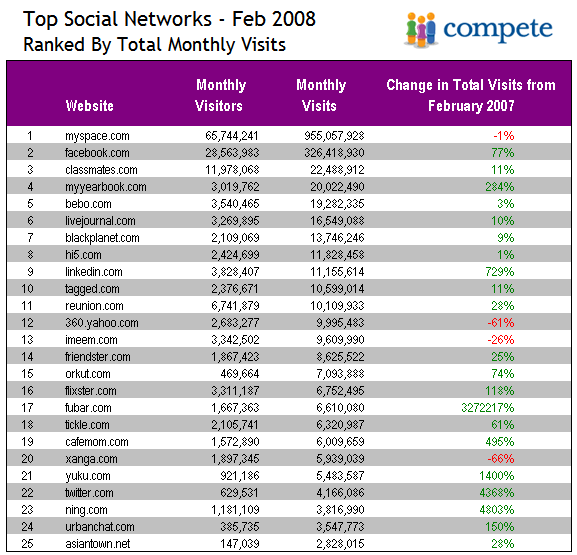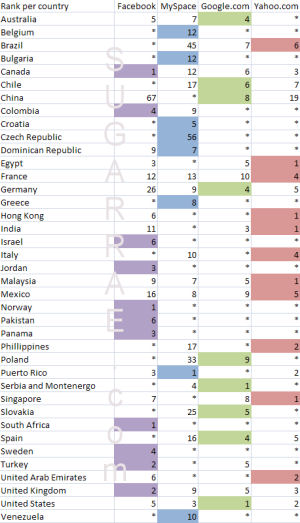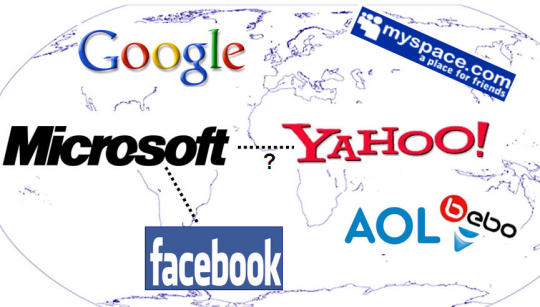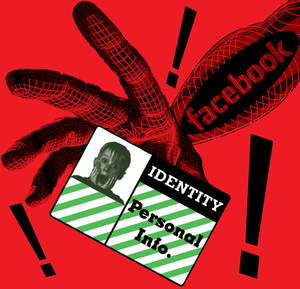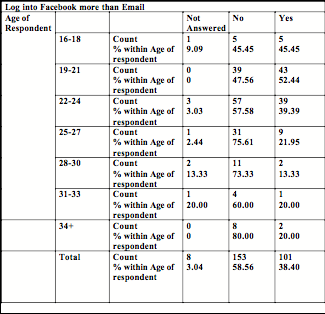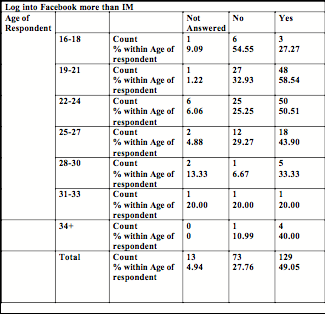Facebook-The New Face of Communication
Contents
Group Name
T.L.C
Group Members
Trish Yarmuch, Carla Christensen, Liang Liu
Initial Project Statement
- Have you ever been in a conversation with someone close to you who asks you," Oh, have you heard that so and so is dating this person or that this person and this person broke up??" And the immediate reply that comes to your lips is, "Oh yeah , I saw that on facebook!!" Well that has happened to us many times over and so we decided to take a deeper look. Our project dives into the world of Facebook and it's underlying effect on communication. We will discuss and compare Facebook to other social networking sites as well as Instant messaging and email. We will also present statistics that show the increasing popularity and use of the site!! The following link takes you to a video that describes in a humorous way how facebook affects our lives!
Video Link: http://www.youtube.com/watch?v=rSnXE2791yg
Introduction
- Facebook gives people the power to share and makes the world more open and connected.Millions of people use Facebook everyday to keep up with friends, upload an unlimited number of photos, share links and videos, and learn more about the people they meet. How is that affecting the world of communication? That’s what we are here to discover.
History of Facebook
- Mark Zuckerberg- former Harvard business student started Facebook as a mean of communication between fellow Harvard students. Only after a few months on the net, nearly all of the students had a Facebook account. It soon expanded to Princeton and Yale, where it was used just as frequently. Mark started to work together with his two friends, Dustin Moskovitz and Chris Hughes, who helped him develop the site even more. After this epidemic spread like wildfire, these three students dropped out of Harvard to work full-time on their Facebook dreams. In August 2005, the domain name Facebook was bought for 200,000 and Facebook begun its journey of becoming one of the most frequently used communication sites worldwide.
Facebook Users
- Facebook began in a dorm-room at Harvard where it quickly spread across campus. Soon enough it expanded to Princeton and Yale. In the beginning, Facebook was limited to college students from recognised schools, organizations and companies. On september 11, 2006, Facebook opened it's doors to everyone 13 years or older with an email account. Facebook is not the top communication site up to date because of these limitations. It's competitors: MySpace, Bebo, etc never did have such limitations.
Facebook Applications
- Facebook offers:
- A personal profile: allows you to add a profile picture and write an array of interests, hobbies, and personal information about yourself (age, birthday, city, etc.)
- The wall: other users can write messages to you on the wall. It is visible to everyone
- Inbox: a message centre that is visible to only the user and those who are included in the `thread`
- Uploading pictures: with an unlimited amount of picture space available, you can upload pictures from any trips or events that you participate in, allowing others users to see and comment on them. You can change the privacy settings so that only certain people can see the pictures. Limit of 60 pictures per album.
- Groups: you can create or join a group, which is usually made for fun involving people with similar interests. Secret or visible
- Events: a great way to plan a party or inform people about something coming up soon. Allows you to give a description of the event and invite as many people you want. The event can be secret or visible to others. It is either inclusive or people can invite friends to the event.
Facebook Statistics
- 120 million active users worldwide
- 85% of students in college have a Facebook account
- 60% of which sign on daily with an average of 20 minutes spent on the site
- 4th most-trafficked website in the world
- Most-trafficked social media site in the world
- 1/4 companies block Facebook from their employees
- Revenue is 300 million USD (2008 est.)
- There are 700 Employee (November 2008)
- Over 55,000 regional, work-related, collegiate, and high school networks
- More than half of Facebook users are outside of college
- The fastest growing demographic is those 25 years old and older
Facebook vs. MySpace
Facebook and MySpace are the two largest social networks in the United States, however MySpace stills leads the race. Although Facebook gets the most buzz, MySpace still has more volume. However, in January 2007, Facebook had 100.7 million unique international visitors compared to MySpace's 109.3 million; a difference of just 8% compared to a year ago when the difference was nearly 400%.
- neatly organized and easy to navigate through the profiles to find the info you want
- clean layout that allows you to find everything right away, and it’s start page is a link to everything
- well-organized picture section and the ability to tag people and have people tag themselves
- A big difference on Facebook is that the friends you add are usually your real friends
- On Facebook it about talking to the people you know and sharing things with them
- Both sites have groups, but Facebook makes them more prominent
- Facebook has two feeds. One tells you what’s new with you, like who accepted your friend request or your posted items, etc. The other feed tells you what’s up with all your friends, like who they added and what groups they joined
- has a place where people can leave messages on your profile and has a basic mail system.
- Facebook makes this really easy because the
MySpace
- MySpace looks so unprofessionally done when compared to Facebook, mainly again because of it’s inconsistent design.
- Fox now owns Photobucket, which provides photo hosting to MySpace users and is making photos on MySpace easier
- you can upload videos
- MySpace is more of a contest for friends.
- MySpace the only way to know if a friend added something new to their profile is to go look at it, and the only way to know if you made a new friends is to look for the person
- has a place where people can leave messages on your profile and has a basic mail system.
- MySpace lets you search for school friends, but doesn’t put the emphasis on real friendships.
- Thousands of bands use MySpace to promote their music and their fans use it to show their support.
- MySpace wins here because adding new friends and accepting friends requests is usually a one click process
- the search engine giant Google is providing MySpace’s search
Take a look at this graph from February 2008. It depicts monthly visits of Social Networks and the percent of growth from February 2007 to 2008. The numbers speak for themselves on this table.
Facebook vs. Internet Giants
Facebooks ever increasing popularity is challenging competitors in ways that they have never imagined. With it's many applications, chat features and maybe even a possible joint search feature with investor Microsoft, Facebook is putting up a huge fight against the competition. The table on the right displays four internet giants and their ranks in the world. The colored squares display the countries where that site is the most ahead of the other giants. As you can see, to date, they are very close in the number of countries that they are ahead in. Of course, the internet giants are not going to stand still while Facebook tries to steal their thunder. Several scenarios could play out, including one of those major sites making an offer Facebook could not refuse.
Facebook & Interpersonal Communication
Mixed Opinions
- Michael Bugeja, author of "Interpersonal Divide: The Search for Community in a Technological Age," said Facebook encourages members to participate in simulated interaction rather than interpersonal interaction.
- "Facebook is not an online community but a mere simulation of the real thing," said Bugeja, director of the Greenlee School of Journalism and Communication.
- He said Facebook is replacing rather than supplementing interaction among college students.
- There are 19,495 ISU members on Facebook, said Chris Hughes, spokesperson for Facebook, who disagreed with Bugeja's assessment of the Web site's impact.
- "Facebook does not replace face-to-face reaction, but instead complements it. People log on and learn a great deal more information about their friends and peers through the site, which can then make face-to-face interaction all the more valuable," he said.
College Upset
- Alumni magazines serve many purposes. They highlight the news and research at their institutions, and serve as fund-raising aids. But their main appeal as an insider to the scoop of the school has increasingly been overtaken by Facebook and similar Web sites. The internet is an incredibly easy and resourceful way to get the information out there and has in that regard taken away from the magazine. Sites, such as Facebook, have taken away from the personal feel and communication of the Alumni magazine.
The Employment Factor
- Employers are known to scan Facebook pages prior to employing someone, A survey released by Viadeo said that 62 per cent of British employers now check the Facebook, pages of some applicants, and that a quarter had rejected candidates as a result. Reasons given by employers included concerns about "excess alcohol abuse", ethics and job "disrespect".
Here is an example of a man fired because of the posting of personnal information on a social network site: "Kevin Colvin, an intern at Anglo Irish Bank, was fired after telling his employers he had a family emergency, but whose Facebook page revealed he had, in reality, been running in drag at a Halloween party.
Facebook vs. Email/Instant Messaging
These tables illustrate the number of people that log onto Facebook more than email or IM. Instant messaging shows more of a difference than email. The only category of people that log onto Facebook more than Email is the under 22 year olds.
Conclusion
- Facebook, the fastest growing social network in the world, is undeniably affecting how the average person communicates. With it's many applications and it's easy to use design, Facebook is attracting more and more users at an incredible rate. Internet Giants, such as Google, Yahoo and MySpace have been caught off guard by the exponential growth of this social network site. Many competitors have begun to add applications to their sites in order to keep up with the pace.
